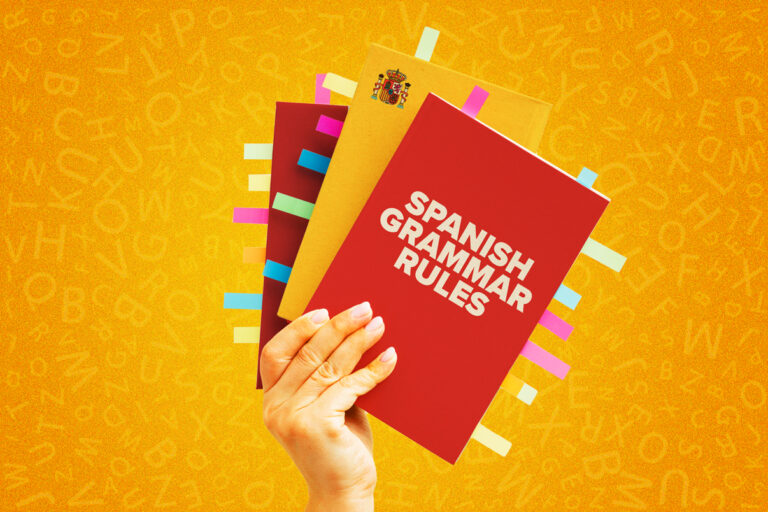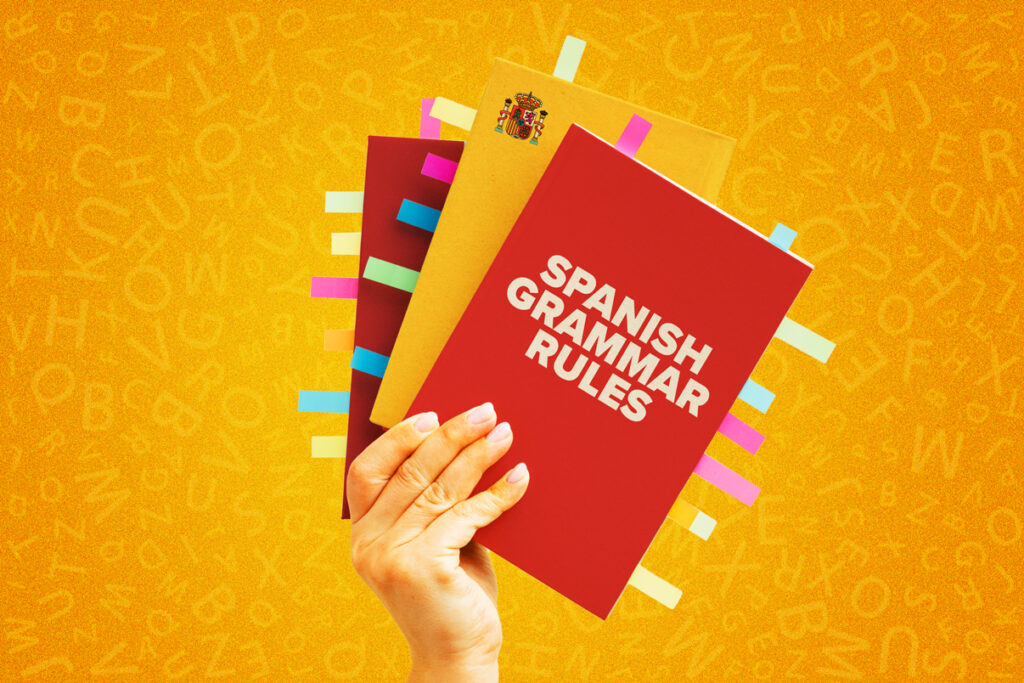
Does Spanish grammar make you sweat?
Do you want to construct and understand native-sounding sentences?
If so, I’m here to help!
In this guide, you’ll find 18 essential Spanish grammar rules, covering everything from Spanish gender and pluralization to sentence structure and verbs!
Contents
Download:
This blog post is available as a convenient and portable PDF that you
can take anywhere.
Click here to get a copy. (Download)
1. Feminine and Masculine Nouns
Nouns in Spanish are either feminine or masculine. We use the article el
for masculine nouns and la
for feminine nouns.
This is easy when it comes to people and living creatures. You’d call a male professor el profesor
, and a female one, la profesora
, for example. You call a male cat el gato
, and a female one, la gata
.
But what about cars, books, tables and chairs? How do we know if they’re masculine or feminine?
Answer: Look at the last letter of the word.
In most cases (but definitely not all!) feminine and masculine words have specific endings. Let’s take a look at them:
Feminine word endings:
Masculine word endings:
As you probably guessed, though, there are (quite a few) exceptions to these rules, but they’re still accurate enough to make the right guess around 70% of the time. You can explore this concept further with these guides on Spanish gender rules and indefinite and definite articles.
2. Noun Pluralization
Like English, making nouns plural in Spanish is straightforward—you simply need to change two things: change el to los
or la to las
, then change the noun to its plural form according to these rules:
After familiarizing yourself with these examples, bookmark our guide on Spanish pluralization to boost your confidence on this simple subject even more.
3. Adjective Gender and Pluralization
Adjectives describe nouns, and in Spanish, they must match their nouns in both number and gender.
If the noun is feminine and singular, then the adjective should be feminine and singular. If the noun is masculine and plural, then the adjective should be masculine and plural. Catch the drift?
Take the adjective rojo (red) as an example. Notice how the adjective changes as it follows the gender and number of its target noun:
El libro rojo
— The red book (masculine, singular)
Las manzanas rojas
— The red apples (feminine, plural)
Gender and pluralization agreement is the first step, but to master adjectives completely (such as knowing where they come in a sentence), check out this complete guide on Spanish adjectives.
4. Using Tú vs. Usted
Unlike English, Spanish conjugates verbs according to level of formality. There are two second-person pronouns: tú
and usted
. They both mean “you,” but tú is informal and usted is formal.
You’d use tú in casual situations, like talking to friends, family, people younger than you, people with the same social status as you (such as coworkers) and the like.
Usted is used in formal situations such as business meetings, job interviews, meeting someone for the first time and people of authority.
Because there are two different pronouns, verbs are conjugated differently depending on which is used.
Usted follows the same conjugation rules as ella and él, whereas tú has its own.
For example:
If you’re still not 100% confident in your ability to determine which pronoun to use, you’ll find this guide on tú and usted helpful.
In the end, knowing which pronoun to use is extremely context-dependent. Which means the more you immerse yourself in Spanish, the easier it’ll get. It can be nerve-wracking in real-life scenarios, but this is why I always recommend consuming a hefty amount of native Spanish media from home.
You can do this easily with a language learning program like FluentU.
5. Ser vs. Estar
Unlike in English, in Spanish there are two ways of saying “to be”: ser
and estar
.
Not only are these both irregular verbs, but using one instead of the other can drastically change the meaning of a sentence. So how do you know which to use when?
Ser is used to identify or describe people and things. As such, you’ll use it when talking about jobs, nationality, belonging and more.
For example:
Nosotros somos muy guapos.
— We are very handsome.
Soy camarero.
— I am a waiter.
Mi primo es de Venezuela.
— My cousin is from Venezuela.
On the other hand, estar is used when you want to express location, feelings and states/conditions (something temporary). Like in these sentences:
Estoy en la escuela.
— I am at school.
Ellos están cansados.
— They are tired.
Sometimes, adjectives can be used with both ser and estar. The difference is that when used with estar it’s more temporary, and with ser, more stable.
Here’s a selection of some of the most important ones:
6. Spanish Contractions
Spanish contractions combine words to make talking easier, smoother and faster. Think of the English words “it’s,” “wasn’t” and “they’re.”
Thus, using them in your own sentences will make you sound more like a native, and learning them will help you understand natural Spanish conversations and media!
There are two main contractions in Spanish: al
and del
.
A + el = al
De + el = del
For example:
Juan subió al tren.
— Juan got on the train.
Es el carro del vecino.
— It’s the neighbor’s car.
These sentences are much easier to say than if the contractions weren’t used (a el tren and de el vecino).
Once you’ve got a grip on these, learn and practice more by reading this guide on Spanish contractions.
7. Spanish Conjunctions
Conjunctions link other words, phrases and clauses together.
In Spanish, the two most important conjunctions to know as a beginner are y
(and) and o
(or).
Sometimes, you’ll see these words change slightly.
- If y is followed by a word that begins with or sounds like i, then y changes to e
.
For example:
Padre y hijo → Padre e hijo
(father and son)
Cruel y inhumano → Cruel e inhumano
(cruel and inhumane)
Try pronouncing them without the conjunction changes, and you’ll understand why native speakers wisely changed the y to e!
- If o is followed by a word that begins with or sounds like o, it becomes u
.
Sujeto o objeto → Sujeto u objeto
(subject or object)
Ayer o hoy → Ayer u hoy
(yesterday or today)
There are also a handful of other conjunctions, such as porque
(because) and como
(as/because), which are useful to know. So once you’re comfortable with y and o, learn the rest with this post on Spanish conjunctions.
8. Por vs. Para
In general, prepositions are easy to understand in Spanish because they practically work in the same way in English. However, two Spanish prepositions are easily confused since they both mean “for” in English: por
and para
.
Here are some guidelines to avoid confusing these terms:
Use por for the following purposes:
Use para for the following purposes:
There’s much more to por and para than what I’ve covered here—such as a list of phrases that take on their own meanings when por or para proceeds them. You can read more about using por vs. para here.
9. Spanish Sentence Structure
Spanish uses the subject—verb—object (SVO) pattern, just like English.
For example, the phrase “She reads a book” in Spanish is Ella lee un libro. The subject (ella) comes first, the verb (leer) comes second and the object (libro) is last.
As you reach upper-beginner and intermediate levels, though, you’ll start to see the occasional verb-subject pattern. For example, these sentences all mean “Juanita works at home”:
Juanita trabaja en casa.
Trabaja Juanita en casa.
En casa trabaja Juanita.
Trabaja en casa Juanita.
Another important word order rule to know is that adjectives come after the object. For example:
El vestido rojo.
— The red dress.
El país grande.
— The big country.
La chica guapa.
— The good-looking girl.
When you’re ready to dive deeper, here’s a bookmark-worthy guide on Spanish sentence structure that’ll take you to the next level.
10. Spanish Verb Conjugation
There are three types of verbs in Spanish, each grouped according to their endings:
The verb examples you just saw are in their infinitive form—they end in r and their endings haven’t changed.
But when using verbs in a sentence, you’ll most likely need to conjugate it—this means you’ll need to take off the ending (-ar, -er or -ir) and replace it with another.
Which ending you choose depends on the pronoun that comes before the verb (yo, tú, él/ella/usted, nosotros, vosotros or ellos/ellas/ustedes) and the tense.
For now, I’ll focus on the present tense. Here are the corresponding endings for each pronoun:
| -ar verbs | -er verbs | -ir verbs | |
|---|---|---|---|
| Yo | -o | -o | -o |
| Tú | -as | -es | -es |
| Él/ella/usted | -a | -e | -e |
| Nosotros | -amos | -emos | -imos |
| Vosotros | -áis | -éis | -ís |
| Ellos/ellas/ustedes | -an | -en | -en |
You can see that the endings for -er and –ir verbs are different to endings for verbs that end in -ar. But the good news is, they’re almost identical to each other apart from the nosotros and vosotros forms.
To see these conjugations in action, let’s look at the verb hablar (to talk) and see how it changes based on the pronoun:
Now let’s see what some -er and -ir verbs look like when conjugated, using aprender (to learn) and vivir (to live) as examples:
Of course, there’s way more to Spanish verbs than this brief rundown. Many tenses are beginner and intermediate-friendly, while others you won’t learn until you reach advanced Spanish grammar.
But now that you know the present tense and the subject pronouns, check out this in-depth post on how to conjugate Spanish verbs when you’re ready to conquer the next.
11. Asking Questions in Spanish
To turn a statement into a question in Spanish is pretty simple: You can either end the sentence with a questioning tone or place the pronoun after the verb.
For example:
¿Tú puedes ayudarme?
— Can you help me?
¿Puedes tú ayudarme?
— Can you help me?
¿Ella baila bien?
— Does she dance well?
¿Baila ella bien?
— Does she dance well?
We also use Spanish question words (also known as the interrogative pronouns) to find out specific information. These are:
For the full rundown, check out this guide to Spanish question words.
12. Direct and Indirect Object Pronouns
Using direct and indirect pronouns alone is quite straightforward.
The direct object pronoun replaces the direct object, and answers the questions “who” and “what.”
While the indirect object pronoun replaces the indirect object and answers the questions “to whom” and “for whom.”
Before looking at some examples, let’s meet the object pronouns.
| Personal Pronoun | Direct Object Pronoun |
|---|---|
| Yo | Me |
| Tú | Te |
| Él/usted (m) | Lo |
| Ella/usted (f) | La |
| Nosotros | Nos |
| Vosotros | Os |
| Ellos/ustedes (m) | Los |
| Ellas/ustedes (f) | Las |
| Personal Pronoun | Indirect Object Pronoun |
|---|---|
| Yo | Me |
| Tú | Te |
| Él/ella/usted | Le |
| Nosotros | Nos |
| Vosotros | Os |
| Ellos/ellas/ustedes | Les |
Now let’s look at the following sentence:
Antonio envía cartas.
— Antonio sends letters.
If we ask “What does Antonio send?” the answer is cartas. Thus, cartas (or, “letters”) is the direct object.
According to the table above, the direct object pronoun for the third person feminine plural is las. So if you want to say “Antonio sends them” instead of “Antonio sends letters,” you’d replace cartas with las, like this:
Antonio las envía.
— Antonio sends them.
Now imagine the following sentence:
Antonio envía cartas a María.
— Antonio sends letters to María.
To whom does Antonio send letters? To María (a María).
María is your indirect object, which according to the table will be substituted by le (third person feminine singular):
Antonio le envía cartas.
— Antonio sends letters to her.
There are a few specific rules for using direct and indirect object pronouns, but once you’ve practiced, they’ll roll off your tongue naturally.
After familiarizing yourself with these examples, check out these guides on direct and indirect object pronouns in Spanish to take it up a notch!
13. Conjugating Gustar (To Like)
The verb gustar
(to like) can be tricky for some Spanish learners because it requires the use of an indirect object pronoun and isn’t conjugated like most verbs.
Instead of conjugating gustar according to the pronoun, you’ll attach the correct indirect object pronoun at the front.
The basic formula is:
Me/te/le/nos/os/les + gusta/gustan + object
If the object is singular, use gusta
. If it’s plural, use gustan
.
For example:
Me gustan los perros.
— I like dogs.
A él le gustan las películas españolas.
— He likes Spanish movies.
Me gusta esta camisa.
— I like this shirt.
Te gusta aprender español.
— You like learning Spanish.
Check out this post on the verb gustar once you’ve got down the basics.
14. Verbs of Change
Los verbos de cambio—or verbs of change—is a group of verbs that mean something like “to become.”
Each should be used in a specific context, though. The most important are:
- Ponerse
. Used for involuntary, uncontrollable reactions
Me pongo nervioso.
— I get nervous.
- Volverse
. Used for sudden and profound changes, often negative
Él se vuelve loco.
— He goes crazy/is going crazy.
- Hacerse
. Used for changes that have been accomplished thanks to one’s own effort and for ideological choices
Se ha hecho rico.
— He has become rich.
Se ha hecho judío.
— He has become a Jew.
- Quedarse
. Used mainly for physical ailments and life-changing events
Mi amigo se ha quedado sordo.
— My friend went completely deaf.
María se ha quedado embarazada.
— María has gotten pregnant.
15. The Imperfect vs. Preterite Tense
As you may already know, there are two simple past tenses in Spanish: the imperfect and the preterite.
The good news is that the imperfect is quite easy to learn. The bad news is that the preterite can give you a headache sometimes, especially if you’re dealing with irregular verbs.
Generally, use the preterite when talking about completed actions that started and finished in the past.
You’ll normally have a definite beginning and end of the action, although they don’t necessarily need to appear in the sentence. For example:
El niño se comió una manzana.
— The boy ate an apple.
Ayer yo visité a mi abuela.
— I visited my grandma yesterday.
On the other hand, use the imperfect when the action was not completed, was repeated or was habitual.
A cool trick is to think any time you’d say “I/you/he/etc. used to…” in English, you’d use the imperfect tense in Spanish.
Let’s look at two examples:
El niño se comía una manzana.
— The boy was eating an apple.
De pequeño, visitaba a mi abuela cada domingo.
— I used to visit grandma every Sunday when I was a child.
You can find out more about these two tenses with this complete guide on the preterite and imperfect.
16. Irregular Spanish Verbs
Spanish irregular verbs are verbs which don’t follow the standard conjugation patterns.
Examples include words like tengo (I have), conozco (I know someone), hago (I do) and more.
Often only the first person singular is irregular, making them fairly easy to memorize. But a few—I’m looking at you, ser and estar—take different forms for all the pronouns (yo, tú, él/ella/usted, nosotros, vosotros, ellos/ellas/ustedes).
Here are a few examples of common irregular verbs in Spanish:
After you’ve learned these, check out this in-depth guide on irregular verbs to master them fully.
17. Reflexive Verbs
A verb is reflexive when the subject is doing something to itself—such as showering, washing, relaxing, going to bed, putting on clothes, etc.
You know a verb is reflexive when an indirect pronoun is either attached to it or in front of it.
As a refresher, the indirect pronouns are:
- Me (instead of yo)
- Te (instead of tú)
- Se (instead of él/ella/usted and ellos/ellas/ustedes)
- Nos (instead of nosotros)
- Os (instead of vosotros)
Take a look at these common Spanish reflexive verbs and how they’re used in sentences:
18. Stem-changing Verbs
Spanish stem-changing verbs also don’t follow the typical conjugation rules. They’re not the same as irregular verbs, though—instead, one or two letters in the stem change when conjugated.
Most verb changes apply to the yo, tú, él/ella/usted and ellos/ellas/ustedes forms, and there are three main types:
- e → ie
- e → i
- o → ue
For example, the verb empezar
(to start) is an e → ie stem-changing verb, repetir
(to repeat) is e → i and poder
(to be able to) is o → ue.
Take a look at how these stem-changing verbs are conjugated in the present tense:
And now you’re ready to go!
There may be times when you feel lost when studying Spanish grammar terms (which is natural!), but with these 18 simple rules, you’ll be well on your way to native-sounding Spanish.
Download:
This blog post is available as a convenient and portable PDF that you
can take anywhere.
Click here to get a copy. (Download)
And One More Thing…
If you’ve made it this far that means you probably enjoy learning Spanish with engaging material and will then love FluentU.
Other sites use scripted content. FluentU uses a natural approach that helps you ease into the Spanish language and culture over time. You’ll learn Spanish as it’s actually spoken by real people.
FluentU has a wide variety of videos, as you can see here:

FluentU brings native videos within reach with interactive transcripts. You can tap on any word to look it up instantly. Every definition has examples that have been written to help you understand how the word is used. If you see an interesting word you don’t know, you can add it to a vocab list.
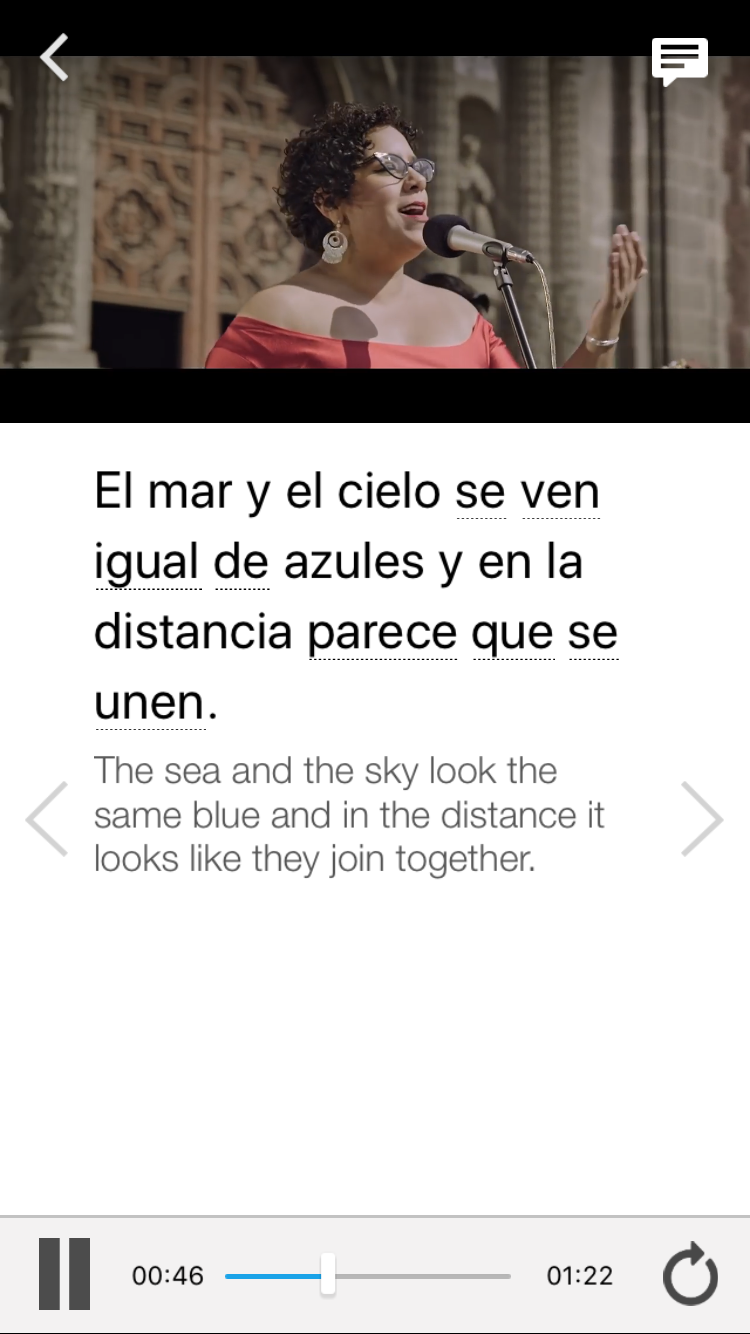
Review a complete interactive transcript under the Dialogue tab, and find words and phrases listed under Vocab.
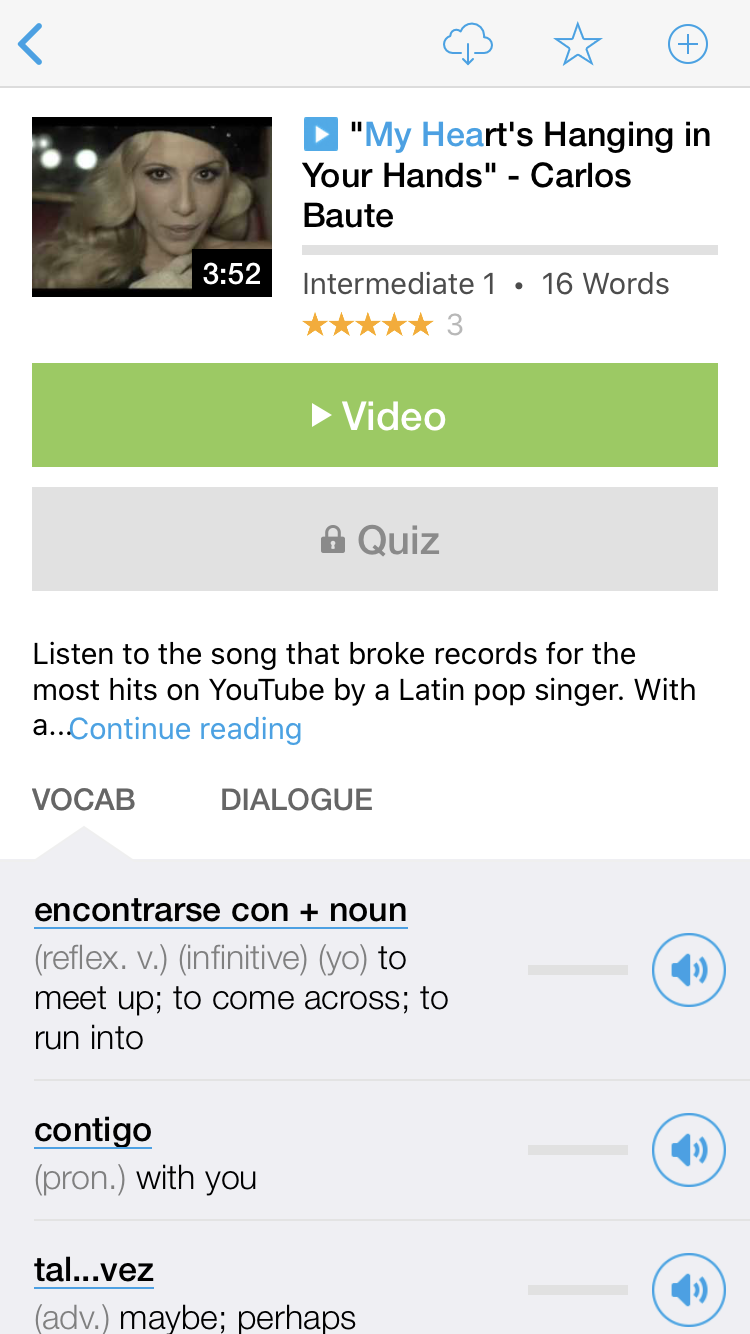
Learn all the vocabulary in any video with FluentU’s robust learning engine. Swipe left or right to see more examples of the word you’re on.
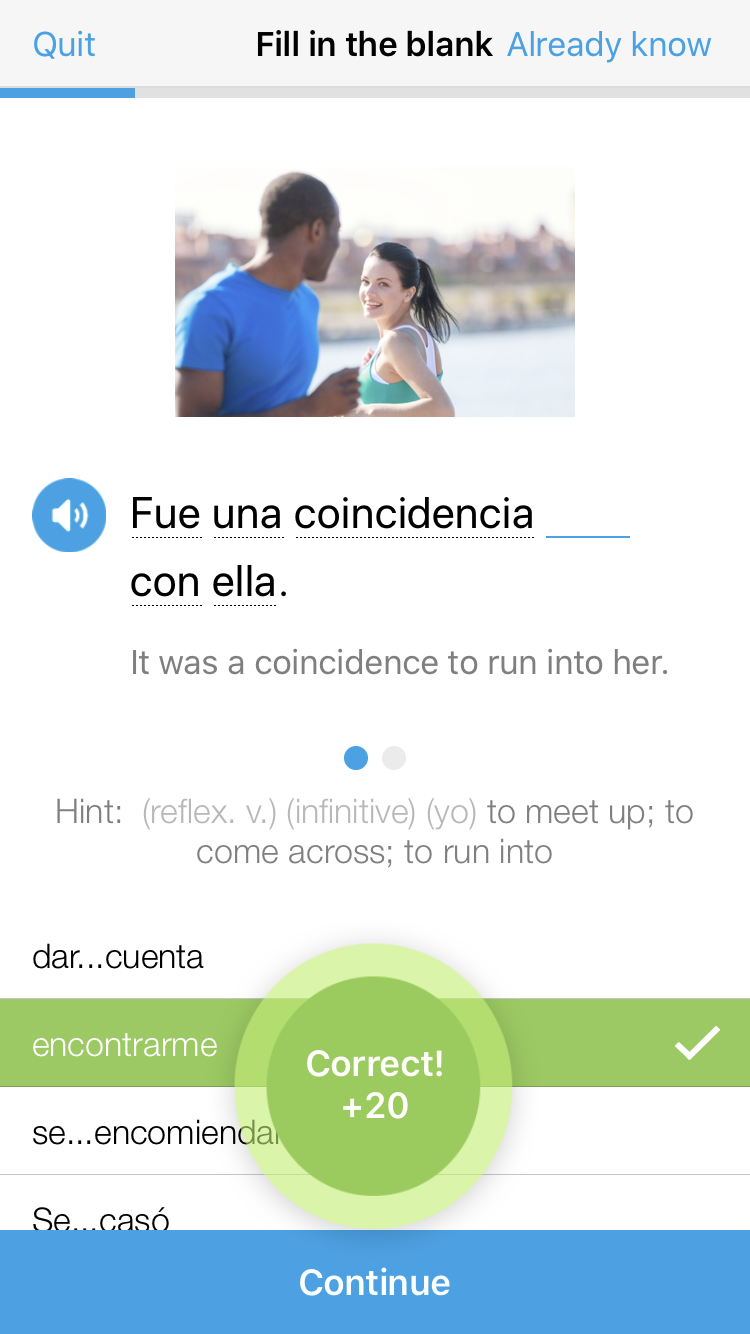
The best part is that FluentU keeps track of the vocabulary that you’re learning, and gives you extra practice with difficult words. It’ll even remind you when it’s time to review what you’ve learned. Every learner has a truly personalized experience, even if they’re learning with the same video.
Start using the FluentU website on your computer or tablet or, better yet, download the FluentU app from the iTunes or Google Play store. Click here to take advantage of our current sale! (Expires at the end of this month.)


